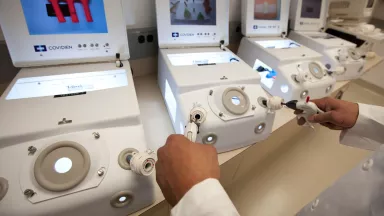Introduction
One of the few of its kind in the country, our Brachial Plexus Program brings together orthopedic surgeons, therapists, neurologists, developmental pediatricians and rehabilitation medicine specialists to provide comprehensive, specialized brachial plexus care. Using a team approach, our experts treat even the most complex brachial plexus and peripheral nerve conditions affecting infants, toddlers, school-aged children, adolescents and young adults. We are a nationally recognized center of expertise for salvage surgeries, which help improve nerve function for children and young adults at all stages of life.
The brachial plexus is a set of nerves that gives sensation to and provides muscle control for the entire arm. Four cervical (neck) nerve roots and one thoracic (chest) nerve root emerge from the spinal cord and combine to form the upper trunk, middle trunk and lower trunk. These nerve roots can be injured at birth during a difficult delivery where the baby gets stuck (shoulder dystocia), or from any injury where the head and shoulder are forced in opposite directions. It can also happen in older children due to trauma, a virus infection or treatments for tumor and cancer. Sometimes the cause is unknown.
We offer a range of treatment options depending on a patient’s needs, from nonoperative therapy to surgical approaches such as nerve grafting, nerve transfers, muscle transfers, free muscle transfers and others.
Early Treatment
After a brachial plexus injury, it is important that your child receives comprehensive care from an experienced surgeon, therapist and pediatric rehabilitation medicine specialist.
Surgery
Surgery for brachial plexus injuries is divided into nerve surgery, which is usually performed within nine months of injury, and salvage surgery, which is typically performed after nerve recovery has stabilized. Salvage surgery endeavors to improve the function of the arm or prevent or mitigate deformity and contractures, and it is often used when prior surgery has failed, or damage was detected late. Treatment in these instances is challenging, and there is no simple way to restore normal function for these children. However, there are many options to improve function, which our team has expertise in.
Physician Referrals
Montefiore Einstein embraces a collaborative approach.
If you have a patient who could benefit from our services, please reach out.
718-920-2060
Schedule a Visit
Have a general question or concern?
We’re available to help you by phone or email.
• 718-920-2060 • orthofeedback@montefiore.org






